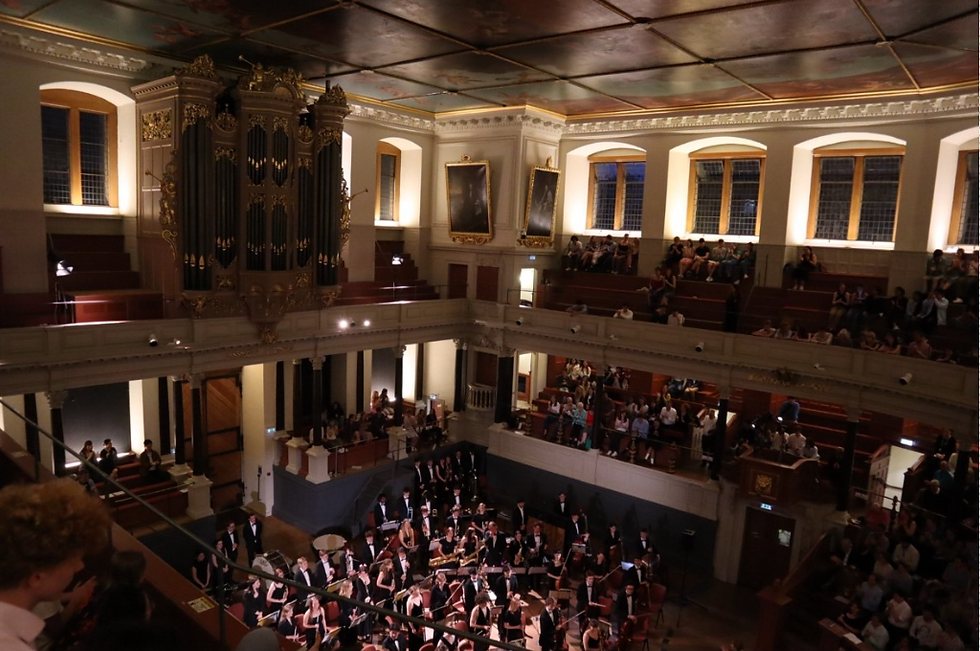REVIEW: Oxford Alternative Orchestra: ‘From the Depths’ – MT18
- Evie Brenkley

- Nov 13, 2018
- 4 min read
by Emily Hazrati
As the name suggests, Oxford Alternative Orchestra (OAO) provides different, often ingenious alternatives to what we might expect from the OUMS orchestras. Founded by the illustrious Hannah Schneider in 2016, the ensemble aims to engage with the city of Oxford through accessible venues, affordable tickets and exciting programmes. Proceeds from OAO’s performances tend to go towards various charities in Oxford; you will all be delighted to hear that ‘From the Depths’ raised significant funds for Oxford Winter Night Shelter, in support of homelessness relief in the city.
Anyone who saw OAO’s debut as a small string ensemble on Monday 29th October would have been overwhelmed by the 57-piece orchestra that evening. As well as all the usual suspects, there was a host of talented freshers, many of whom we would see again in the OUO concert later that week. Schneider had clearly worked hard to expand the orchestra to meet the demands of the programme; equally, who could possibly resist the temptation of the gorgeous Russian music on offer? The atmosphere was buzzing and there was a great feeling that every single performer really wanted to be there, which came across through the deeply musical, committed playing that followed.
We began the evening with Shostakovich’s Cello Concerto No.1, which has to be one of the most exciting ways to start a concert. The opening showed off the talented wind section who would prove to be an unstoppable force: I was particularly impressed by Benji Hartnell-Booth’s solos, whilst Joshua Grubb and Aaron Hartnell Booth’s high unison passages were close to perfection. Generally, the strings were excellent: their crescendos when the theme was first passed onto them (1st movement) packed quite a punch and they achieved a beautiful Russian sound, especially in the 2nd movement.
Then of course there’s the Andrew Snell, who deserves nothing but the highest praise for his characterful, technically assured performance. His actions were full of intent and were backed by an original interpretation of a rather over-programmed concerto. The 3rd movement of this concerto is a terrifying, 5-minute long cadenza, which Snell made easy work out of. This evening must have been a proud moment for him – he will without a doubt go on to be a fine professional cellist.
My one main criticism would be that the connection between the orchestra and the soloist was occasionally lost, particularly in the 4th movement, where the two got noticeably out of sync on several occasions. On a slightly more subjective note, I also found the 4th movement a tad fast for my liking and would have liked to hear even more phrasing in the 2nd movement. On the whole though, a polished, exciting performance of a seriously challenging piece.
By this point, we were all on the edges of our seats, waiting with eager anticipation as three more horns and row of trumpets and trombones joined the party. Having heard Tchaikovsky’s 5th and 6th Symphonies performed earlier this year by Oxford University Philharmonia and Oxford Millenium Orchestra respectively, I was excited to hear what our conductor would do with his immense Symphony No.4 in F Minor. Safe to say I was far from disappointed. Although her interests extended far beyond the Russian sphere, this is clearly some of the music Schneider knows and loves best. It was in this half that she particularly came into her own, demonstrated a nuanced knowledge of the score and a great depth of musicality.
For me, the Tchaikovsky was also where strings particularly shone, filling Tchaikovsky’s long, lyrical lines to the brim with emotion. Their sound was committed, warm and intense when it needed to be. Thus, I was substantially moved by their playing, and in disbelief that this sense of fullness was created by a string section of no more than 8 desks per part! Symphony No.4 can feel long and tiresome if not enough is put into it, particularly with the 1st movement’s massive Exposition. And yet there was no yawning or looking down at watches in the audience as we were carried away by the musical drama that ensued. The second movement was sensitively executed and included some stunning solos from Emily Crichton (oboe) and Bruce Parris (bassoon), whilst the strings had great fun with the lighter, pizzicato 3rd movement. In general, though, the winds seemed quite at times: either they could have sung their lines more or the strings could have given them more room to flourish. As for the Russian festive finale, I was blown away by how polished the fast scalic passages were, the precision of tuning and the overwhelming energy from every single member of the OAO.
‘From the depths’ was an all-round brilliantly concert to be enjoyed by all – I wouldn’t have wanted to spend my otherwise dreary Monday evening any differently. Huge congratulations must go to the amazing musicians making up Oxford Alternative Orchestra, their talented leader Violetta Suvini, the incredible Andrew Snell and, of course, to Hannah Schneider for all her hard work to make it happen. I can’t wait to see what is next in store; word has it that in Hilary Term, the efforts of the two latest concerts will unite as Tchaikovsky meets opera… Needless to say, COUNT ME IN!







Comments